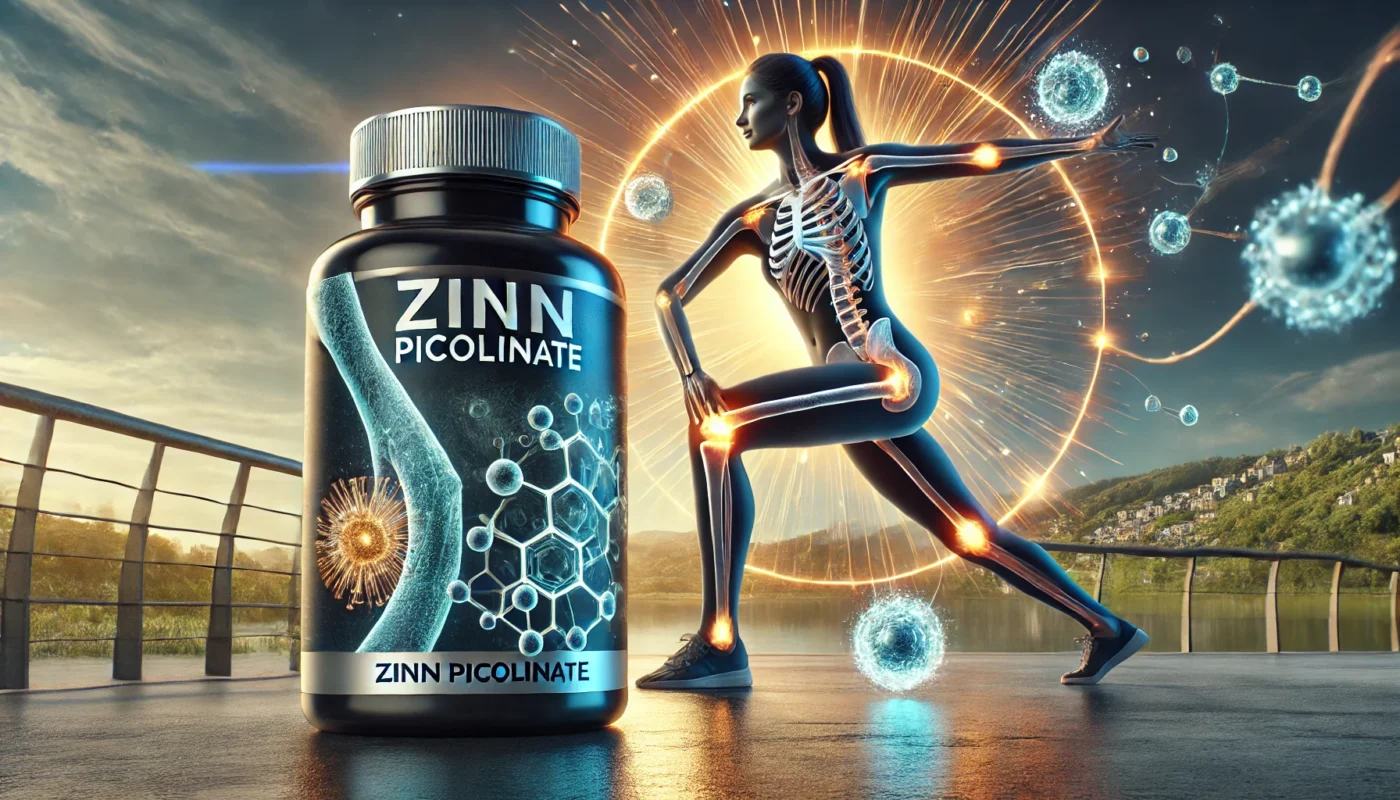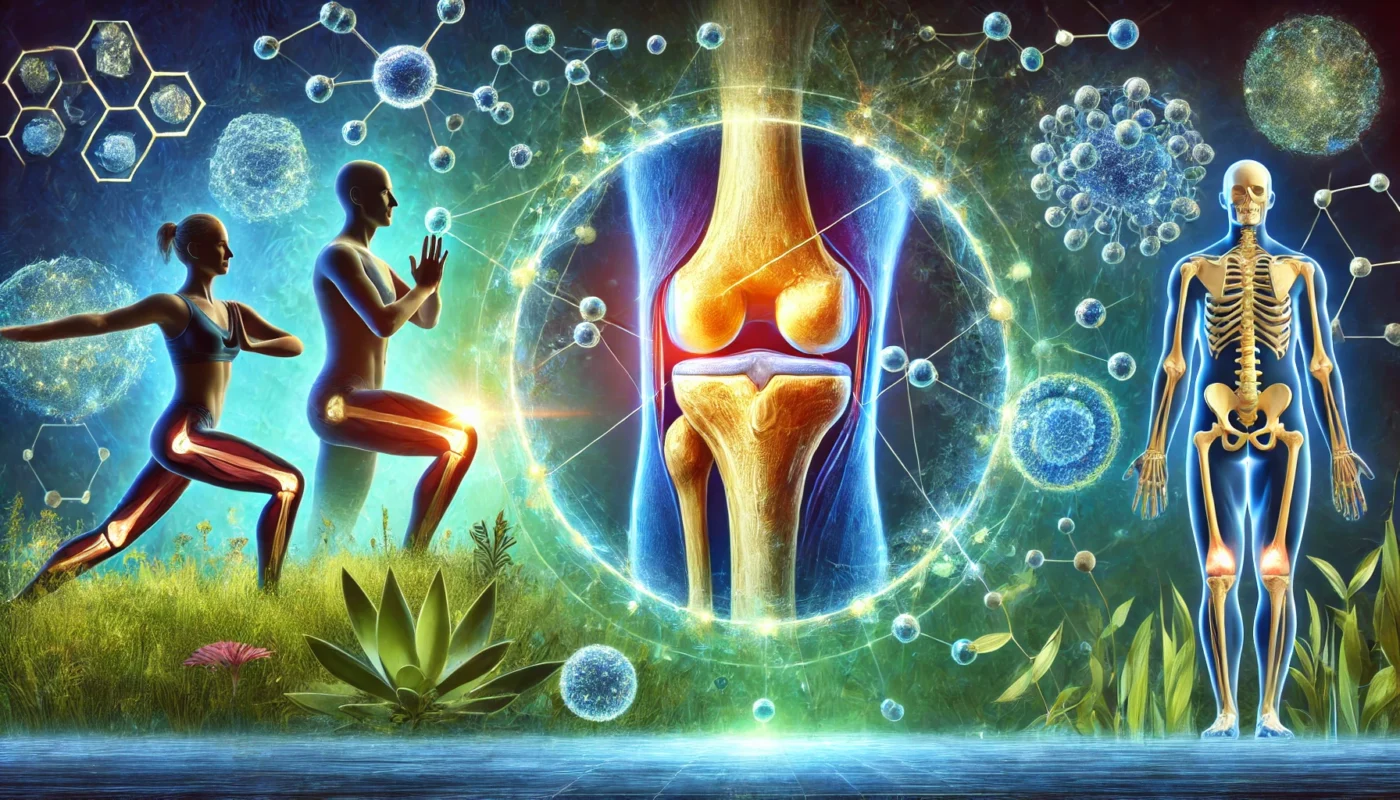Maintaining healthy joints is crucial for athletes and active individuals who subject their bodies to rigorous physical demands. Joints not only support movement but also endure stress from repetitive impact, intense workouts, and aging. Over time, this strain can lead to inflammation, cartilage damage, and conditions like osteoarthritis. Zinc, an essential trace mineral, has garnered attention for its role in reducing inflammation, promoting tissue repair, and protecting joint integrity. Among zinc supplements, zinc picolinate stands out for its superior absorption and bioavailability, making it a practical choice for those seeking to support joint health and sustain active lifestyles.
This article explores the science behind zinc picolinate’s benefits for joint health, its role in inflammation management, and clinical evidence supporting its effectiveness.
You May Also Like:
Zinc Picolinate as a Daily Supplement: Essential for Modern Wellness
Zinc Picolinate for Joint Health: Supporting Active Lifestyles is an original (HSLHealing) article.
Why Joint Health Matters for Active Lifestyles
Joints are the connections between bones that enable movement and provide support. Healthy joints rely on several components:
- Cartilage: A smooth, rubbery tissue that cushions bones and prevents friction.
- Synovial Fluid: A lubricating liquid that reduces wear and tear.
- Ligaments and Tendons: Structures that stabilize joints and connect muscles to bones.
For athletes, maintaining joint health is critical to performance and longevity. Joint injuries, inflammation, and chronic conditions can limit mobility and reduce quality of life. Supporting joint health through nutrition, including adequate zinc intake, can help mitigate these risks.
The Role of Zinc in Joint Health
Zinc is a vital nutrient involved in numerous biological processes essential for joint maintenance and repair. These include:
- Collagen Synthesis:
Zinc is necessary for the production of collagen, a protein that provides structural support to cartilage, ligaments, and tendons. - Inflammation Regulation:
Zinc modulates the immune response, reducing the production of pro-inflammatory cytokines that contribute to joint pain and swelling. - Antioxidant Protection:
Zinc acts as a co-factor for superoxide dismutase (SOD), an enzyme that neutralizes free radicals and protects joint tissues from oxidative damage. - Cartilage Integrity:
Zinc supports chondrocytes, the cells responsible for maintaining and repairing cartilage, ensuring long-term joint functionality.

What Is Zinc Picolinate?
Zinc picolinate is a chelated form of zinc, where zinc is bound to picolinic acid to enhance its absorption and bioavailability. This form is particularly beneficial for individuals with absorption challenges or increased zinc requirements, such as athletes and older adults. Zinc picolinate ensures efficient delivery of zinc to tissues, maximizing its protective and reparative effects on joints.
Zinc Deficiency and Joint Health
Zinc deficiency is more common than many realize, affecting up to 17% of the global population, according to the World Health Organization (WHO). Athletes and active individuals are particularly at risk due to:
- Increased Losses Through Sweat: Physical activity raises zinc excretion, leading to depletion.
- Higher Nutritional Demands: Active lifestyles require additional nutrients for tissue repair and recovery.
- Dietary Restrictions: Certain diets may lack sufficient zinc-rich foods.
Consequences of Zinc Deficiency on Joints:
- Impaired collagen production, weakening cartilage and connective tissues.
- Increased inflammation and oxidative stress, exacerbating joint pain and swelling.
- Delayed recovery from joint injuries or strain.
How Zinc Picolinate Supports Joint Health
Zinc picolinate plays a crucial role in maintaining and protecting joint health through the following mechanisms:
1. Reducing Inflammation
Zinc regulates the immune system, decreasing levels of inflammatory cytokines such as interleukin-6 (IL-6) and tumor necrosis factor-alpha (TNF-α). Chronic inflammation is a major contributor to joint degeneration and conditions like arthritis.
- Research Insight: A study in Nutrients found that zinc supplementation reduced inflammation markers in individuals with osteoarthritis, improving joint comfort and function.
2. Promoting Cartilage Repair
Zinc supports chondrocyte activity, ensuring the maintenance and repair of cartilage. Healthy cartilage prevents bone-on-bone friction and preserves joint integrity.
- Clinical Evidence: Research published in Osteoarthritis and Cartilage demonstrated that zinc supplementation enhanced cartilage repair in animal models of joint degeneration.
3. Enhancing Collagen Synthesis
Collagen provides structural support to joints. Zinc is a co-factor for enzymes involved in collagen production, ensuring the strength and resilience of joint tissues.
- Study Finding: A study in Biological Trace Element Research showed that individuals with higher zinc levels exhibited better collagen integrity, reducing the risk of joint injuries.
4. Protecting Against Oxidative Stress
Oxidative stress damages joint tissues, accelerating the progression of inflammatory conditions. Zinc’s role as an antioxidant shields cells from free radical damage, preserving joint health.
- Evidence: A study in Free Radical Biology and Medicine highlighted zinc’s ability to reduce oxidative damage in synovial joints, slowing the progression of arthritis.
5. Supporting Post-Injury Recovery
Athletes frequently experience joint injuries, such as sprains and strains. Zinc accelerates tissue repair and reduces inflammation, speeding up recovery.

Clinical Studies Supporting Zinc for Joint Health
- Zinc and Osteoarthritis (2017):
A study in Nutrients evaluated the effects of zinc supplementation in patients with osteoarthritis. Participants receiving 30 mg of zinc daily for 12 weeks reported reduced joint pain and improved mobility compared to the placebo group. - Zinc and Inflammatory Arthritis (2014):
Research in Rheumatology International found that zinc supplementation lowered inflammatory markers and improved joint function in individuals with rheumatoid arthritis. - Zinc for Post-Exercise Recovery (2019):
A clinical trial in Journal of Sports Science and Medicine showed that zinc supplementation reduced inflammation and enhanced recovery in athletes following intense training, protecting joints from overuse injuries.
Signs of Zinc Deficiency in Athletes
Athletes experiencing the following symptoms may benefit from zinc supplementation:
- Persistent joint pain or swelling
- Delayed recovery from injuries
- Frequent colds or infections (weakened immunity)
- Fatigue and reduced endurance
- Hair thinning or brittle nails (common in zinc deficiency)
Dietary Sources of Zinc
While zinc picolinate supplementation is highly effective, dietary intake also contributes to maintaining zinc levels. Foods rich in zinc include:
- Animal-Based Sources: Oysters (highest natural source), beef, poultry, and eggs.
- Plant-Based Sources: Legumes (e.g., chickpeas, lentils), seeds (e.g., pumpkin and sunflower seeds), and nuts (e.g., cashews, almonds).
Athletes following plant-based diets may require supplementation to meet their zinc needs, as plant-based zinc is less bioavailable.
Recommended Dosage and Safety
The recommended dietary allowance (RDA) for zinc varies by age and gender:
- Adult men: 11 mg/day
- Adult women: 8 mg/day
Therapeutic doses for joint health often range from 20–40 mg/day, depending on individual needs and activity levels. However, excessive zinc intake (above 40 mg/day) can cause:
- Nausea and gastrointestinal discomfort
- Copper deficiency (zinc competes with copper absorption)
Consult a healthcare provider before starting zinc picolinate supplementation to determine the appropriate dosage.

Combining Zinc Picolinate with Other Nutrients for Joint Health
Zinc picolinate works synergistically with other nutrients to maximize joint protection and repair:
- Vitamin D:
Supports calcium absorption and bone health, complementing zinc’s role in joint maintenance. - Collagen Peptides:
Supplementing with collagen provides the raw materials for tissue repair, enhancing zinc’s effects. - Omega-3 Fatty Acids:
Reduce inflammation and support joint lubrication, boosting zinc’s anti-inflammatory properties. - Glucosamine and Chondroitin:
These compounds aid cartilage repair and work alongside zinc to protect joint tissues.
Future Research Directions
While existing studies highlight zinc’s benefits for joint health, further research could explore:
- The long-term effects of zinc supplementation on joint degeneration and arthritis prevention.
- Synergistic effects of zinc with other joint-supportive supplements.
- The role of zinc in maintaining joint health in aging athletes.
Conclusion: Zinc Picolinate for Joint Health and Active Lifestyles
Zinc picolinate offers a powerful, science-backed solution for athletes and active individuals seeking to protect their joints and enhance recovery. By reducing inflammation, promoting cartilage repair, and supporting collagen synthesis, zinc picolinate addresses key factors influencing joint health and performance longevity.
For those striving to maintain an active lifestyle, incorporating zinc picolinate into a comprehensive nutrition plan can provide the support needed to keep joints healthy and resilient. As always, consult with a healthcare provider or sports nutritionist to tailor supplementation to your individual needs.

References
- Zinc supplementation is associated with a reduction in serum markers of inflammation and oxidative stress in adults: A systematic review and meta-analysis of randomized controlled trials. Retrieved from: https://pubmed.ncbi.nlm.nih.gov/33333394/
- Zinc in Wound Healing Modulation. Retrieved from: https://pmc.ncbi.nlm.nih.gov/articles/PMC5793244/
- The Impact of Trace Elements on Osteoarthritis. Retrieved from: https://pmc.ncbi.nlm.nih.gov/articles/PMC8732765/
- Zinc and Cadmium in the Aetiology and Pathogenesis of Osteoarthritis and Rheumatoid Arthritis. Retrieved from: https://pmc.ncbi.nlm.nih.gov/articles/PMC7824316/
- The Role of Zinc in Male Fertility. Retrieved from: https://pmc.ncbi.nlm.nih.gov/articles/PMC7589359/
- Zinc supplementation improves bone density in patients with thalassemia: a double-blind, randomized, placebo-controlled trial. Retrieved from: https://pmc.ncbi.nlm.nih.gov/articles/PMC3778866/
Important Note: The information contained in this article is for general informational purposes only, and should not be construed as health or medical advice, nor is it intended to diagnose, prevent, treat, or cure any disease or health condition. Before embarking on any diet, fitness regimen, or program of nutritional supplementation, it is advisable to consult your healthcare professional in order to determine its safety and probable efficacy in terms of your individual state of health.
Regarding Nutritional Supplements Or Other Non-Prescription Health Products: If any nutritional supplements or other non-prescription health products are mentioned in the foregoing article, any claims or statements made about them have not been evaluated by the U.S. Food and Drug Administration, and such nutritional supplements or other health products are not intended to diagnose, treat, cure, or prevent any disease.

